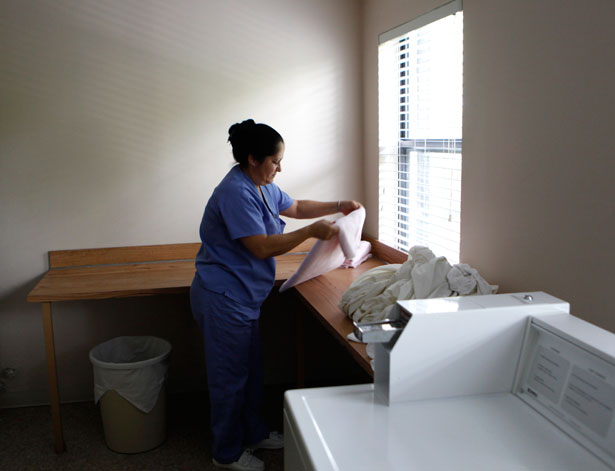
A homecare worker in Miami Florida (AP Photo/Lynne Sladky)
Nearly two years after promising to make the change, the Obama administration announced today that it will extend minimum wage and overtime protections to the nation’s homecare workers. The workers, most of them women, were previously not covered due to the “companionship exemption” in the Fair Labor Standards Act (FLSA). The new protections will take effect in January of 2015.
Activists have been pushing for the change for quite some time. As Bryce Covert has pointed out, an expansion of the FLSA was even included among the demands of the 1963 March on Washington for Jobs and Freedom. In the fifty years since the march, homecare work has become one of the fastest growing fields in the country, while remaining one of its lowest paid. Homecare workers make an average of $9.70 an hour and nearly 40 percent rely on Medicaid or food stamps.
Beginning in March of this year, Nation readers joined the growing call for President Obama to fulfill his promise with an open letter that garnered many hundreds of signatures. One reader, a homecare worker herself, listed the demands of her job: “I have provided physical rehabilitation care, wound care, emotional and psychological care (counseling/listening) for families and their loved ones,” she wrote, “I have provided Hospice care, pet care, plant care, personal care, yard care and I could list much more.”
While the changes will greatly expand the protections offered homecare workers, there is still much to be done to improve the lives of domestic workers more broadly. Andrea Mercado, the Campaign Director for NDWA, pointed out over email that, while the changes are important and “long overdue,” they “do not solve all of the issues that domestic workers face.” The NDWA and other organizations will continue to push for more labor protections for domestic workers through Domestic Workers Bill of Rights legislation passed on the state level.
Nation readers have also joined that campaign, sending nearly 900 letters to their state legislators asking for a Domestic Workers Bill of Rights in their state. New York and Hawaii have already passed versions of the law and a bill in California was recently passed by the legislator and is awaiting the Governor’s signature. If your state hasn’t gotten on board yet, take a minute to join the campaign. And if you live in California, call Governor Jerry Brown at 916-445-2841 and demand that he sign AB241 to expand labor protections for California’s domestic workers.


